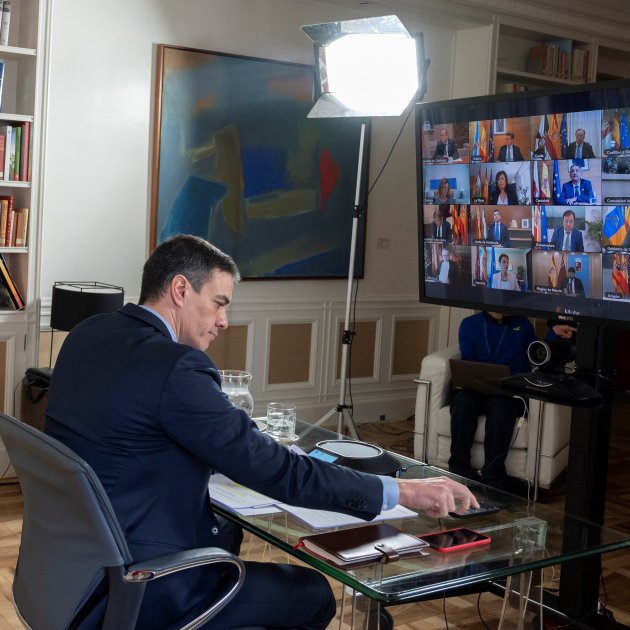Once again, Pedro Sánchez's response has been the same: his Spanish government, under its assumed state of alarm powers, does not contemplate allowing Catalonia a full lockdown that would close its perimeter, something Quim Torra's Barcelona administration has been demanding for days in its efforts to battle the rapidly-expanding Covid-19. In the press conference after today's Spanish cabinet meeting, prime minister Sánchez resorted to one of his stock phrases and claimed that "the virus does not respond to borders." After that, he went off into other matters without responding. The new refusal comes a few hours after the state authorized the closing of the ports and airports of the Balearic Islands.
The Catalan government's decision to isolate its whole territory, subject to Madrid's permission, continues without official response from the Moncloa palace. However, Torra did receive a response via the press conference. Pedro Sánchez stressed that he has already said it on "many occasions" and has even "spoken" about it to the head of the Catalan government: that "the virus does not respond to borders or territories" and that "the ability to contain it is within each of us." For all these reasons, he demanded a move away from "political noise" and a focus on the fight against the pandemic. He is convinced that with the measures he is deploying, "we will be able to contain the propagation of the virus."
At the press conference which served to announce a broad economic action plan endowed with 200 billion euros, the prime minister was unable to escape the political criticism. Even in his very first response he went onto the defence: "Let's get away from the noise and let everyone do their job." He defended that the Spanish state had taken action "from the first minute." Yes, he admitted that perhaps there had been "errors", as there had been in all countries, but he assured that "there will be time to evaluate that with a cool head and learn lessons so that it does not happen again." He insisted on the "responsibility" and "unity of action" of all political leaders. "Our effort must, at least, match the sacrifice that the Spanish people are making," he said.
In this context, Sánchez took the opportunity to praise the work of Fernando Simón, director of Spanish health ministry's Centre for Health Alerts and Emergencies, who he considered "essential" and "educational" in "understanding how we can all cope with the pandemic." He repeatedly appealed to the public to maintain their "exemplary" social behaviour: "Now it is more important than ever that we need to take responsibility, to avoid going out unnececessarily. Let's be patient, very patient. Together we'll resist the blows of the pandemic, we will never surrender and we will overcome it."
"Economic reconstruction budget"
Without abandoning a political discourse, Pedro Sánchez defended that the Spanish state will, after this crisis, need a new "budget for economic and social reconstruction". Just at the time when the coalition government's accounts for the year ahead were beginning to be considered by Congress, when has already approved its broad financing proposals, the Spanish PM admitted that the budget will have to be made using provisions "which, right now, there is no body that can calculate." He pointed out that "it's very difficult to assess the shock to the GDP and destruction of jobs." He recalled that all these measures "will imply a special budget effort."
